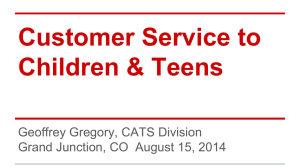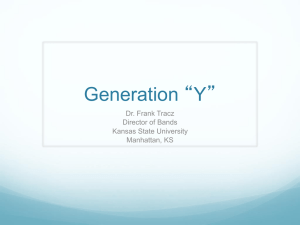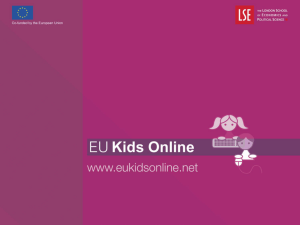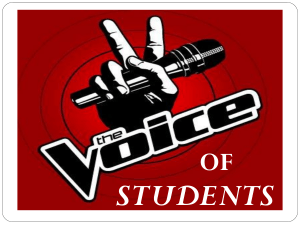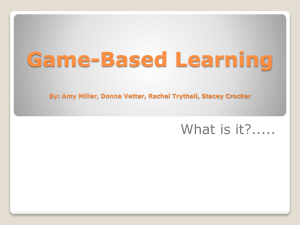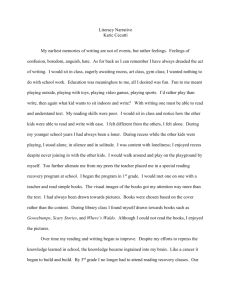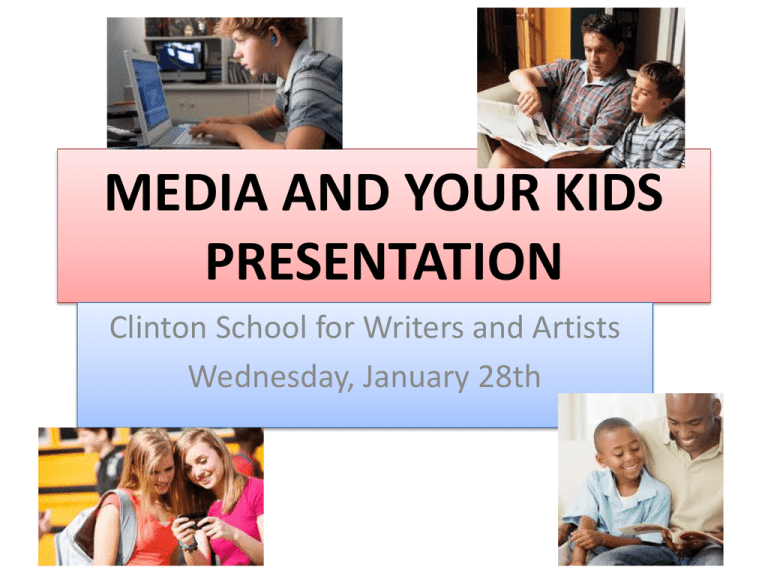
MEDIA AND YOUR KIDS
PRESENTATION
Clinton School for Writers and Artists
Wednesday, January 28th
National Association for
Media Literacy Education
The National Association for Media Literacy Education
(NAMLE) is a professional association for educators,
academics, activists, and students with a passion for
understanding how the media we use and create affect our
lives and the lives of others in our communities and in the
world. The NAMLE vision is to help individuals of all ages
develop the habits of inquiry and skills of expression that
they need to be critical thinkers, effective communicators and
active citizens in today’s world.
What is Media?
The means of communication, as radio and
television, internet, newspapers, and
magazines that reach or influence people
widely.
What is Media Literacy?
The ability to ACCESS, ANALYZE,
EVALUATE, CREATE and
COMMUNICATE information.
Why is Media Literacy important?
Your beliefs become your thoughts,
Your thoughts become your words,
Your words become your actions,
Your actions become your habits,
Your habits become your values,
Your values become your destiny.
― Mahatma Gandhi
Where do we get our beliefs?
What are the messages we are getting?
The media have become the mainstream
culture in children’s lives. Parents have
become the alternative. Americans once
expected parents to raise their children in
accordance with the dominant cultural
messages. Today they are expected to raise
their children in opposition to it.
- Ellen Goodman
The average American child age 8 or
older spends more than seven hours
a day with screen media.
(Kaiser Family Foundation, 2010)
Parents today are the
last people in
history to know
life with and without
the Internet.
MEDIA SATURATION
OPPORTUNITY
POSSIBILITY
RISK
ARE WE THAT OLD?
REMEMBER WHEN EMAIL
SEEMED CUTTING EDGE?
FACEBOOK
TWITTER
EMOTICONS
INSTAGRAM YIKYAK
SNAPCHAT
HANDLE
POST
HASHTAG
TEXT
LOL
ASK FM
POS
LMFAO
DISCUSSION BOARDS
BRB
WIKIPEDIA
APPS
JK
BLOGS
INSTANT MESSAGE
IPADS
SMART PHONES
Cyberbullying
Addiction Privacy
Predators
Sexting
Plagiarism
Ruined Reputations
Losing Control
MAIN MEDIA CHALLENGES FOR PARENTS
(adapted from commonsensemedia.org)
• Media is personal, private and portable
– We have no control!
– Everything happens so fast!
• Children’s exposure to inappropriate content
– Violence
– Adult behavior; sex, smoking, drinking
– Body image/consumerism
• How to teach your child online ethics
– Social media consequences
– Credibility of information
– Safety Concerns
PARENTS MUST BE
FULL TIME
FIRE-FIGHTERS
- Gloria DeGaetano
What the drive-in was to teens
in the 1950s and the mall in the
1980s, Facebook, texting,
Twitter, instant messaging, and
other social media are to teens
now.
*danah boyd
The difference from when
we were growing up…
Persistence
Visibility
Spreadability
Searchability
*danah boyd
IN DEFENSE OF TEENAGERS
Elizabeth Gilbert
Today's American teenagers are the most
sensitive, least violent, least bullying, least
racist, least homophobic, most globally-minded,
most compassionate, most environmentallyconscious, least dogmatic, and overall kindest
group of young people this country has ever
known.
Adolescents/ Teenagers
Today and Always
•
•
•
•
•
•
•
•
Finding their identity
Want privacy and separation
Brain is developing
Risk takers, boundary pushers
Less freedom to wander
More scheduled
More parental involvement
Academic pressure
Why do adolescents and teens love
social media so much?
• Social lives, friends
• Public places are off limits, inaccessible to
teens
• They seek youth centric community
THE MYTH OF THE DIGITAL NATIVE
DO OUR KIDS REALLY KNOW WHAT THEY ARE DOING?
Kids are often technical savvy
but that does not mean they are
media literate.
THE MYTH OF THE DIGITAL NATIVE
DO OUR KIDS REALLY KNOW WHAT THEY ARE DOING?
• Kids don’t always pay attention to their
digital footprint.
• Kids don’t understand that what they put
online can remain online for a long, long
time.
• Kids don’t realize that once something is
posted on the Internet it can come back to
haunt them.
• Kids don’t realize that what they post sets
their reputation.
The 5 E’s
• Explain
• Engage
• Empathize
• Educate
• Empower
Explain
•
•
•
•
•
•
Outline your expectations
Discuss the technology
Overview the etiquette
Talk about technology before you purchase it
Set guidelines and rules before usage
Be proactive not reactive
Engage
•
•
•
•
Get to know the social media apps
Talk about the media they use
Discuss movies, TV programs, You Tube videos
Make sure your conversations aren’t only
about what they shouldn’t be doing
• Tell them about the media you like
• Ask questions
Empathize
Kids are growing up in a public space.
We made mistakes in private.
Kids today don’t have that luxury.
Consequences are far greater.
Educate
•
•
•
•
Prepare vs protect
Teach vs tell
Explore the subject
Learn how to have media literacy
conversations in the home
Empower
•
•
•
•
•
Encourage their media creation
Tell them about new apps, new sites
Sign them up for classes
Teach them new skills
Trust them
Helping young people navigate public life safely
should be of significant public concern.
But it’s critical to recognize that technology
does not create these problems,
even if it makes them more visible and
even if news media relishes using technology
as a hook to tell salacious stories about youth.
REMEMBER
TECHNOLOGY
WILL CONTINUE TO CHANGE.
GOALS OF
PARENTING STAY THE SAME.
Michelle Ciulla Lipkin
Executive Director
mciullalipkin@namle.net

